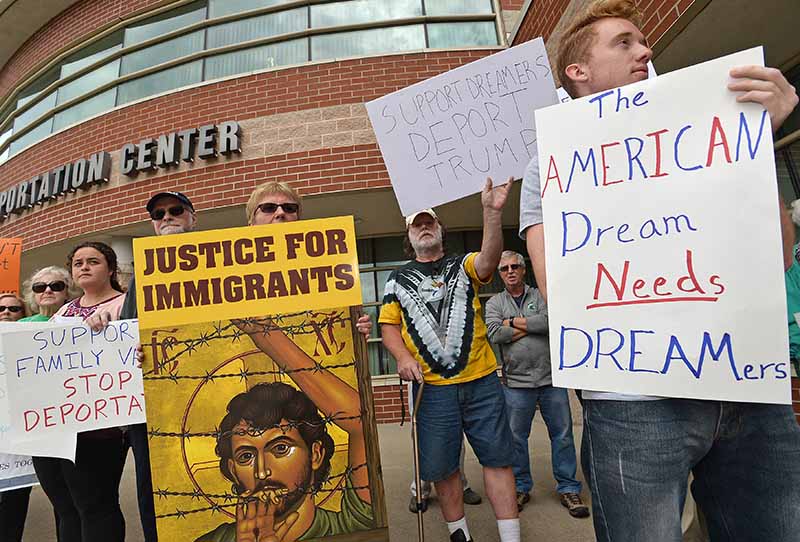Philippines to assist Filipinos who may be deported from US

People at the Intermodal Center in Erie, Pa., protest President Donald Trump's decision to rescind former President Barack Obama's Deferred Action for Childhood Arrivals (DACA) policy, which protects children of undocumented immigrants from being deported, Wednesday, Sept. 6, 2017. From left are: Janice Etchison (with yellow sign), of Harborcreek Township, Erie County, Pa.; Mike Kurutz (with sign in air), 61, of Erie; and Kyle Lambing, far right, 21, who is a Penn State Behrend student from Conneaut Lake, Crawford County, Pa. U.S. Rep. Mike Kelly, of Butler, R-3rd Dist., who represents the city of Erie and parts of Erie County and several other counties, has an office in the Intermodal Center. Christopher Millette/Erie Times-News via AP
MANILA, Philippines — The Philippines will assist some 10,000 Filipinos who may be deported after the U.S. administration decided to rescind a program that allows undocumented immigrant children to stay legally in the United States, officials said Wednesday.
Foreign Secretary Alan Peter Cayetano said funds earmarked to assist Filipinos overseas can be released to help those affected by the revocation of the Deferred Action on Childhood Arrivals, or DACA.
He called on Filipinos in the U.S. to actively support efforts to pass legislation that would benefit immigrants enrolled in DACA. Those who may be affected should hope for the best but be prepared for the worst, he said.
"In any event, we are ready to welcome and assist our (compatriots) in whatever way we can if they are returned to the Philippines," Cayetano said in a statement.
The Philippine Embassy in Washington said there are 3.4 million Filipinos in the U.S., and some 310,000 of them are undocumented.
DACA was created by President Barack Obama in 2012 after intense pressure from immigrant advocates who wanted protections for the young immigrants who were mostly raised in the U.S. but lacked legal status.
The program protects them from deportation — granting a two-year reprieve that can be extended and by issuing a work permit and a Social Security number.
DACA recipients must meet several requirements, including having no criminal record. Immigrants who are accepted into the program and later get arrested face deportation to their home country.
They also must have been 30 or younger when the program was launched and brought to the U.S. before age 16.
- Latest
- Trending
































